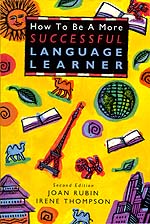
How To Be A More Successful Language Learner, second edition
Heinle and Heinle Publishers/Wadsworth
120 pp, 1994
Unpriced: Amazon.com price US$31.95 (1999 Nov.)
ISBN 0-8384-4734-1
Contents:
Preface
Forwords
Part One: Before You Begin
- Everything Depends on You
- Age and Foreign Language Learning
- Language Learning Aptitude
- Psychological Predispositions
- Past Experiences
- Language Learning is a Long Process
- Language Learning is a Process of Successive Approximation
- Language Learning May Affect You Emotionally
- Learning a New Language May Be Especially Difficult for Some People
- Why Study a Foreign Language?
- What Are Your Objectives?
- Speaking Objectives
- Reading Objectives
- Listening Objectives
- Writing Objectives
- Informal Settings
- Formal Settings
- Combining Formal and Informal Settings
- Independent Study
- Selecting the Right Language Course
- Locating the Right Language Course
- About Communication
- Two Kinds of Messages: Referential and Social
- The Three Activities of Communication
- Problems in Sending and Recieving Messages
- Language is Creative
- Language is Systematic
- Languages are Both Similar and Dissimilar
- Language Teachers
- Language Textbooks
- Dictionaries
- Reference Grammars
- Media Materials
Chapter 1 You, the Language Learner
Chapter 2 The Language Learning Process
Chapter 3 Clarifying Your Objectives
Chapter 4 Planning Your Language Study
Chapter 5 The Communication Process
Chapter 6 The Nature of Language
Chapter 7 Language Learning Resources
Part Two: Once You Begin
- Find Your Own Way
- Plan
- Monitor and Evaluate
- Cultural Knowledge
- Linguistic Knowledge
- Contextual Knowledge
- Textual Knowledge
- World Knowledge
- Why Assess?
- How to Assess?
- Questionnaire 1: Executive Control
- Questionnaire 2: Strategies
- Strategies for Learning Vocabulary
- Strategies for Learning Grammar
- Getting Started
- Strategies for Developing Listening Skills
- Getting Started
- Strategies for Developing Reading Skills
- Getting Started
- Strategies for Developing Speaking Skills
- Getting Started
- Strategies for Developing Writing Skills